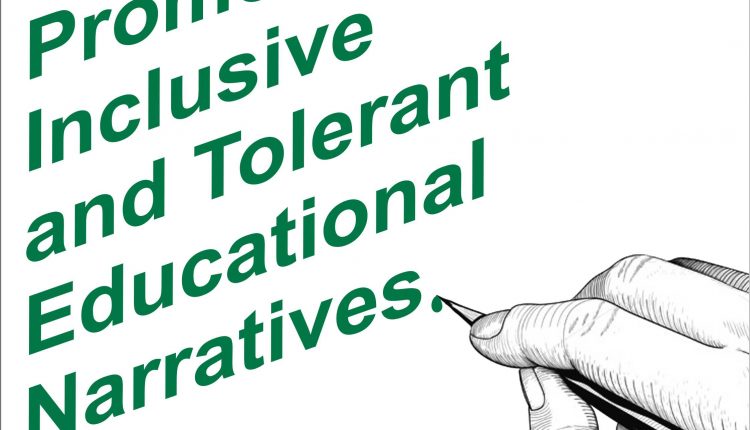Promoting Inclusive and Tolerant Educational Narratives


- After Study Hours: Exploring the Madrassah Mindset
- Education for peace and harmony
- Reconstruction of the National narratives and Counter-Violent Extremism Model for Pakistan
- Role of Post-Noon Engagements of Madrassa Students in Radical Orientation
- Promoting Inclusive and Tolerant Educational Narratives
- Islam, Democracy and the Constitution of Pakistan
- Minority Rights in Pakistan: Historic Neglect or State Complicity?
- “Creating an environment that counteracts militant ideologies and radicalism in Pakistan”
- Through Each Other’s Eyes
- The Role of Ulema in Promotion of Peace and Harmony in Society
- Critical Ideologies: A Debate on Takfeer & Khurooj
- سماجی ہم آہنگی ، رواداری اور تعلیم
- سماجی ہم آہنگی کیسے ہو؟
- اسلام جمہوریت اور آئین پاکستان
- پر امن اور متوازن معاشرے کے قیام میں علماء کا کردار
- اسلام جمہوریت اور پاکستان
- ایک دوسرے کے نظر سے
- مسئلہ تکفیر و خروج
- Media Safety in Pakistan
- محفوظ اور ہم آہنگ پاکستان
- Reconstruction of the national narratives and counter-violent extremism model for pakistan
- Secure and Inclusive Pakistan
- تعلیم امن اور ہم آہنگی
- Regulating Broadcast Media: Challenges & Reforms
- Pakistan’s Sectarian Mire & The Way Forward
- Dialogue Pakistan 2019 report
- Pakistan’s achievements in war on terror but at what cost: a special review of the current decade
- Pakistan in changing world order
- Who Am I
- Academic and Intellectual Dialogue on Social Harmony, Tolerance and Education
- Youth Engagement in Pakistan: Baseline Evaluation and Way Forward
- Dialogue Pakistan 2020
- Strengthening Governance in Pakistan
- Youth Perspective on Society, Religion, And Politics
- Supporting the Afghan peace process: Pakistan’s position, interests and policy options
- Afghanistan as Seen from Pakistan I
- Afghanistan as Seen from Pakistan II
- Perspectives from Pakistan on Afghan peace and reconciliation 1
- Discourse with Balochistan Youth on Society, Religion, and Politics
- Perspectives From Pakistan on Afghan Peace and Reconciliation 2
- How Youth in Sindh View State, Religion and Politics
- Afghan Peace and Reconciliation: Pakistan’s Interests and Policy Options II
- Interfaith Relations in Pakistan Perspectives and Worldview of Youth in Punjab
- Afghanistan as Seen from Pakistan III
- Making Sense of Pakistani Youth How Youth in Pakistan View State, Society, Religion, and Politics
- PERSPECTIVES FROM PAKISTAN ON AFGHAN PEACE AND RECONCILIATION 3
- AFGHAN PEACE AND RECONCILIATION: PAKISTAN'S INTERESTS AND POLICY OPTIONS 3
- A Path to Peace
- Countering Violent Extremism on Campuses A Faculty-Oriented Policy Brief
- PERSPECTIVES FROM PAKISTAN ON AFGHAN PEACE AND RECONCILIATION 4
- Afghanistan as Seen from Pakistan IV
- AFGHAN PEACE AND RECONCILIATION: PAKISTAN’S INTERESTS AND POLICY OPTIONS 4
- Afghanistan as Seen from Pakistan V
- AFGHAN PEACE AND RECONCILIATION: PAKISTAN’S INTERESTS AND POLICY OPTIONS 5
- PERSPECTIVES FROM PAKISTAN ON AFGHAN PEACE AND RECONCILIATION 5
- Charter of Peace
- AFGHAN PEACE AND RECONCILIATION: PAKISTAN'S INTERESTS AND POLICY OPTIONS VI
- AFGHANISTAN AS SEEN FROM PAKISTAN-VI
- PERSPECTIVES FROM PAKISTAN ON AFGHAN PEACE AND RECONCILIATION 6
- Youth for interfaith harmony Newsletter 1
- AFGHAN PEACE AND RECONCILIATION: PAKISTAN’S INTERESTS AND POLICY OPTIONS
- PERSPECTIVES FROM PAKISTAN ON AFGHAN PEACE AND RECONCILIATION 7
- AFGHANISTAN AS SEEN FROM PAKISTAN-VII
- YOUTH AND THE SOCIAL CONTRACT IN PAKISTAN
- Pakistan’s Afghan perspective and policy options
- Charter of Peace
- PERSPECTIVES FROM PAKISTAN ON AFGHAN PEACE AND RECONCILIATION 8
- AFGHANISTAN AS SEEN FROM PAKISTAN-VIII
- AFGHAN PEACE AND RECONCILIATION: PAKISTAN'S INTERESTS AND POLICY OPTIONS 8
- AFGHAN PEACE AND RECONCILIATION: PAKISTAN’S INTERESTS AND POLICY OPTIONS 9
- AFGHAN PEACE AND RECONCILIATION: PAKISTAN'S INTERESTS AND POLICY OPTIONS - 11
- Pakistan's Evolving Militant Landscape: State Responses and Policy options
- AFGHAN PEACE AND RECONCILIATION: PAKISTAN’S INTERESTS AND POLICY OPTIONS – 12
- TRENDLINES OF PAKISTAN'S SECURITY CHALLENGES
Education constitutes one of the foremost components of most of the counter-violent extremism (CVE) models and frameworks currently being implemented in the Muslim-majority and Western countries. In countries like Pakistan, where education, both mainstream and religious, is considered by many to have been a factor in the promotion of ideological radicalization and violent extremism, the need to promote inclusive and tolerant educational narratives becomes even more significant and pressing. Against this backdrop, Pak Institute for Peace Studies (PIPS) engaged leading and senior faculty members–mostly from Islamic studies and Arabic departments1–of universities and colleges from across Pakistan in three two-day academic and intellectual dialogue-cum-training workshops in 2016. The purpose was to influence teachers as well as educational discourse in support of inclusive, tolerant and harmony-supporting education including education curricula. This report provides a summary of the proceedings of these workshops including key findings and participants‟ responses collected before and after each workshop through two types of survey questionnaires.

